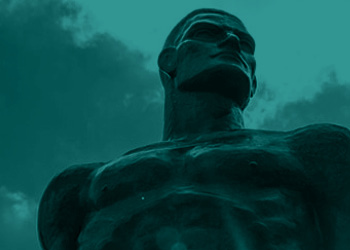Sports: The Sun Shines on Saban's Spartans

Nick Saban's team overcomes adversity and makes the Sun Bowl for its second consecutive postseason appearance. The 1996 Spartan football season began with adversity--NCAA sanctions along with key personnel losses. But the team character that emerged during the 1996 season reflected Nick Saban's competitive attitude.
By season's end, MSU defied expert predictions and achieved its second straight winning season--6-5 overall, 5-3 in the Big Ten. Except for the Nebraska loss, MSU had chances to win every game--showing that the young program is ever so slightly away from championship contention.
The season began in the face of tremendous adversity. Besides losing key offensive producers like quarterback Tony Banks, wide receiver Muhsin Muhammad and all-purpose back Scott Greene--all now playing in the NFL--MSU faced:
- NCAA probation, along with recruiting restrictions and loss of scholarships, for a series of infractions committed prior to Saban's return to MSU as head coach.
- The loss of several players, including projected starters at tailback, defensive end and defensive back, due to academic ineligibility.
- The loss of key players to injury (tight end Marcus Chapman) and to personal reasons (defensive lineman Matt Laurino).
- Constant rumours and unfounded media predictions that Saban would become a head coach in the NFL next season--an unsettling, albeit 'flattering' distraction.
The fear that these setbacks would hurt performance was dispelled when MSU stunned Purdue 52-14 in the season opener at Spartan Stadium. Freshman running back Sedrick Irvin scored four touchdowns, enroute to an all-time MSU freshman record of 18 touchdowns along with 1,036 yards. MSU did not follow up that explosive debut with an upset of defending national champions Nebraska. The Cornhuskers prevailed 55-14, but most of its points came from special teams and the defense rather than its offense--a testament to MSU's improved defense. By allowing Nebraska only 298 yards, MSU's defensive line--keyed by tackles Robert Newkirk and Chris Smith, ends Dimitrius Underwood and Courtney Ledyard, and coached by newcomer Todd Grantham--proved far more effective than last year's line.
However, key injuries to quarterback Todd Schulz and middle linebacker Reggie Garnett hurt MSU, which lost 30-20 at home to Louisville. The Spartans limited Louisville to only 52 yards rushing, but the Cardinals came up with three big aerials for 71, 51 and 45 yards, all resulting in touchdowns. Sophomore quarterback Gus Ornstein started his first game.
After a 47-0 pasting of Eastern Michigan, led by redshirt freshman quarterback Bill Burke, MSU resumed Big Ten competition.
The game at Iowa proved to be a heartbreaker. MSU seemed to dominate the trenches, scoring 17 unanswered points in the opening quarter. Running backs Irvin and senior Duane Goulbourne gobbled up 246 yards rushing, with great play by the OL--tackles Flozell Adams and David Mudge, guards Scott Shaw and Brian Mosallam, center Matt Beard and tight end Josh Keur. MSU outgained Iowa 399-315 and totaled 24 first downs to the Hawkeyes' 15. But Iowa capitalized on second-half big plays by their special teams and won the only statistical category that counts, the final score, 37-30.
Despite the setback, Saban and his coaching staff were able to produce four wins in the next five Big Ten games. Todd Schulz returned at quarterback and sustained a 65 percent completion rate--tops in MSU football history. MSU's wins were solid and convincing--beating Illinois 42-14, Minnesota 27-9, Wisconsin 30-13, and Indiana 38-15. The only loss was 29-45 to Michigan, a contest that was closer than the score indicated. The Wolverines scored three quick touchdowns in the last three minutes of the first half, taking advantage of MSU turnovers. That gave the Maize and Blue their revenge over last year's 28-25 Spartan victory in East Lansing. 'I was proud of the way the team came out in the second half,' says Saban. 'We felt we could still win the game and I still felt we could when we pulled to within 35-23. But the turnovers and mistakes were just too much to overcome, especially by a top 10 team.'
By season's end, it was clear MSU had become a more productive team than last year's surprise Independence Bowl squad--a credit to Saban's quality coaching staff. MSU did lose its finale to Penn State 32-29, the difference being that PSU made its field goal chance while MSU missed. The Spartans showed they could play evenly with a Top 10 team, and as the team matures, perhaps it will learn to win the big away games in the future.
Under offensive coordinator Gary Tranquill, MSU was averaging 32.9 points per game--second in the Big Ten. Wide receiver Derrick Mason was MSU's 'go to' guy, averaging 141 all-purpose yards per game--4th in the Big Ten--and nearing 5,000 all-purpose yards for his career. Wide receiver Nigea Carter and Octavis Long also made huge plays for the Spartans to complement the running duo, led by fullbacks Garett Gould and Travis Reece.
Under defensive coordinator Dean Peas, MSU was allowing an average of 285.4 yards (vs. 411.5 yards last year)--again, second in the Big Ten. MSU's rushing defense went from last to third, allowing in 10 games only 5 rushes of 20 or more yards, vs. 13 last year. Linebackers Ike Reese and Reggie Garnett anchored the linebacking crew, while safety Sorie Kanu and cornerbacks Amp Campbell and Ray Hill provided MSU's last line of defense.
Rounding out the coaching staff are Charlie Baggett, Jim Bollman, Pat Shurmur and Bobby Williams on offense; Greg Colby, Mark Dantonio and Todd Grantham on defense; and Ken Mannie in strength and condition.
For Spartan fans, one bright note was MSU's relative youth. MSU started only five seniors on offense, two on defense. The two-deep roster included 12 freshmen--15 with punter Paul Edinger, long snapper Kyle Rance and short snapper Mike Neal--and 10 sophomores. This looms as a formidable group to follow in the upcoming seasons.